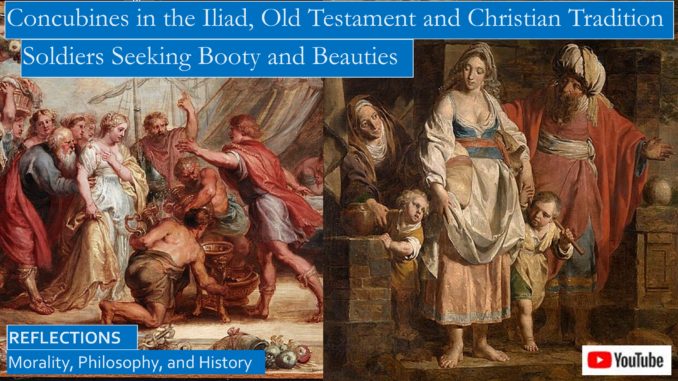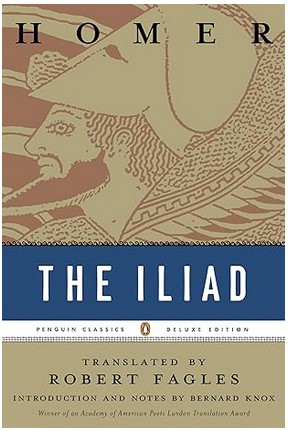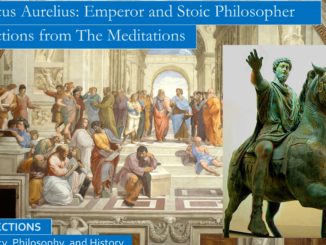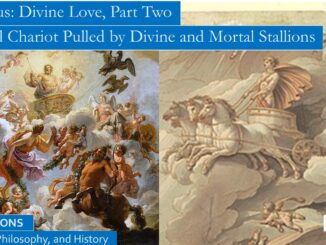
We continue with the opening of the saga of the Iliad. Before attacking Troy, the Greeks first attacked and sacked the cities of their allies surrounding Troy, and carried off many of their young maidens as newfound concubines, King Agamemnon won the young girl Chryseis, while Achilles won the beauty Briseis.
Chryses, the father of Chryseis, priest to Apollo, visits the armed camp of the enemy, the camp of the Greeks, alone, unarmed, bringing a ransom for his beloved Chryseis. Chryses is shown no hospitality by King Agamemnon, but is discourteously told to leave from whence he came, which is what initially angered the gods, this breaking of hospitality is something you just do not do.
REFLECTIONS ON THE ILIAD
Iliad Blog 1: Iliad, Blog 1, Why Should a Christian Read the Iliad?
http://www.seekingvirtueandwisdom.com/iliad_blog01/
The Iliad, the Basis of Greek Culture and the Western Philosophical Tradition
https://youtu.be/DpmuhZJUJn0
Iliad Blog 2, Captured Concubines in the Iliad and the Torah
http://www.seekingvirtueandwisdom.com/iliad_blog02/
YouTube video for Blogs 2 and 4: Concubines in the Iliad, Old Testament, and Christian Tradition
https://youtu.be/bGHHD7XTvr0
YouTube script with more book links:
https://www.slideshare.net/BruceStrom1/concubines-in-the-iliad-old-testament-and-christian-tradition
Iliad, Blog 3, The Warrior Cultures of the Iliad and the American Indian, Bravely Visiting the Enemy Camp
http://www.seekingvirtueandwisdom.com/iliad-blog-3-visiting-the-enemy-camp-greeks-vs-indians/
https://youtu.be/ynIx-AVI2f8
The Iliad Blog 5, the Tide of Battle Turns Against the Greeks
http://www.seekingvirtueandwisdom.com/the-iliad-blog-5-the-tide-of-battle-turns-against-the-greeks/
The Iliad Blog 6, Embassy to Achilles, Oration, Failed Meeting
http://www.seekingvirtueandwisdom.com/the-iliad-blog-6-embassy-to-achilles-oration-failed-meeting/
The Iliad Blog 7, the deaths of Patroclus and Hector
http://www.seekingvirtueandwisdom.com/the-iliad-blog-7-the-deaths-of-patroclus-and-hector/
This video approximately corresponds to blogs 5 through 7, with some additional material:
The Iliad of Homer: Glory, Honor, Madness, and Futility of War: https://youtu.be/7lI2ZQ50wRc
CONTINUING WITH THE ILIAD
Chryses has only one option, he prays to Apollo. Apollo, the god of medicine and the god of plague, shoots his holy arrows among the Greeks hitting first dogs, them mules, then men, infecting many in camp with the plague.
For nine days the plague raged, and on the tenth day Achilles asked a seer to peer into the motives of the gods, and after an augury he answered,
“The god is enraged because Agamemnon spurned his priest,
he refused to free his daughter, he refused the ransom.”
King Agamemnon was not an absolute king, he was but the leader of the expedition. Achilles and Odysseus and Nestor and the might valorous men were kings in their own right, respectful of the authority of Agamemnon for the duration of the Trojan War. He is compelled in council to give up his prize, the young girl Chryseis to her father Chryses, for the good of the Greek army, but he does not surrender her nobly, he behaves badly, he behaves like a spoiled child, demanding:
“Fetch me another prize, and straight off too,
else I alone of the Argives go without my honor.
That would be a disgrace. You are all witnesses,
look – MY prize is snatched away!”
But what is at stake is not his prize, but his pride, he chides Achilles:
I will “take Briseis in all her beauty, your own prize –
so you can learn just how much greater I am than you!”
Achilles started to draw his sword and slay the wayward monarch on the spot, but Athena intervenes, and he slides his sword back into its sheath. Achilles instead lashes him with angry words:
“Staggering drunk, with your dog’s eyes, your fawn’s heart!
Never once did you arm with the troops and go to battle
or risk an ambush packed with Achaea’s picked men,
you lack the courage, you can see death coming.
Safer by far, you find, to foray through the camp,
commandeering the prize of any man who speaks against you.
King who devours his people! Worthless husks, the men you rule.”
Professor Elizabeth Vandiver opines that Agamemnon did much more than rob from Achilles his concubine, that in his hubris he stripped from Achilles not his armor but worse, stripped from him his honor and his glory, making him lose face before his comrade. Indeed, gaining respect and avoiding shame is critical for warriors, and men in any age. But I think a careful reading hints the understated feelings of Achilles for Briseis lurks beneath the stoic mask he must wear as a warrior, feelings that cannot crack through the mask lest they mar his dignity.
Achilles and his subjects the Myrmidons withdraw from the battle and encamp on the shore next to his ships. His best friend Patroclus sadly deliver Briseis to Lord Agamemnon. Achilles retires to the shore of the sea, from which rises up Thetis, his goddess mother, to whom he discusses his plight. She reveals to Achilles his dual fate, either he stays and wins honor and glory and imminent death on the battlefield, or he could sail back to Greece quietly and live a long an uneventful life in obscurity, a choice he would gladly choose if he could leave with his beauty Briseis, which is out of the question, for we cannot abort plotline of the Iliad.
Thetis agrees to plead his case with Zeus, who arranged to let the tide of battle turn to favor the Trojans, until they drive the Greeks to the sea and start burning the Greek ships. Achilles barely mentions Briseis in his telling of the story to his mother Thetis, but she and the other gods know what is in his heart.
GENEOLOGIES
Much of Book 2 of the Iliad is a long listing the many city-states who contributed armies to the common cause. Ancient writings are fond of such lists, they resemble the genealogies in both Genesis and Matthew and Luke. Professor Vandiver tells of the debates scholars have over these lists, but I think the simplest explanations are sometimes the best explanations. First, they refer to characters in other stories that have long been lost in the sands of history but are still very familiar to their ancient audiences. Second, you can imagine the Iliad being recited in a religious festival, the citizens of each city-state would wait for their mention in the saga, maybe they would cheer when their city is named by the bard.
THE DUEL COMMENCES
The Iliad, the tragic tale of men behaving badly, the tragic tale of gods behaving badly, and how misery and death stalks thousands because of their obstinacy. Such are the tales of men and war.
When the battle lines are forming, but before the battle commences,
“Hector raked his brother with insults, stinging taunts:
‘Paris, appalling Paris! Our prince of beauty,
mad for women, you lure them all to ruin!
Would to god you have never been born, and died unwed.
That is all I would ask. Better that way by far
than to have you strutting here, an outrage,
a mockery in the eyes of all our enemies.”
Hector is wearing from this war being fought over the adultery of his brother.
Why lead thousands to die for such lust? Let his brother fight this war,
Let his brother face his foe the noble King Agamemnon,
Let Paris and Agamemnon face off one on one, man to man.
Let them duel to the death, let them fight for the hand of Helen.
So, Hector bravely marches calmly to the Greek lines alone,
Some Greeks let their arrows fly, but Agamemnon bids them to halt,
To halt while they hear what proposal Hector means to propose.
Agamemnon and all the Greeks listen intently and agree,
Let the armies take off their armor in the field,
Let King Agamemnon face the adulterous Paris in a duel,
Let the two of them decide who takes the hand of Helen
Let the two of them duel to decide the fate of this dreadful war.
But before the duel commences there is an offering to the gods, so there is a rare truce allowing those high on the wall of Troy to survey the opposing army.
Old King Priam spies Helen, but amazingly shows no anger, as he calls to her,
“Come over here, dear child. Sit in front of me,
so you can see your husband of long ago,
your kinsmen and your people.
I don’t blame you. I hold the gods to blame.
They are the ones who brought this war upon me.”
Then he asks her to point out the Greek warriors she spies on the field.
“And Helen the radiance of women answered Priam,
‘I revere you so, dear father, dread you too,
if only death had please me then, grim death,
that day I followed your son to Troy, forsaking
my marriage bed, my kinsmen and my child,
my favorite then, now full-grown,
and the lovely comradeship of women my own age.
Death never came, so now I can only waste away in tears.’ “
For many pages the tragically radiant Helen relates to Priam
the many characters in the noble world she left behind in Greece.
They spy Odysseus, broad shouldered, raging behind the lines like a ram,
And talks of Menelaus, the clear speaking, noble Agamemnon,
they spy the giant Ajax, his massive shoulders towering over his men.
Helen points out many more Greeks to Priam, but two she cannot find,
“Castor breaker of horse and the hardy boxer Polydeuces,
My blood brothers, my mother bore them both.
Perhaps they refused to join the men in battle,
dreading the scorn, the curses hurled at me.”
Sadly, she had been gone from home so long she did not know,
that they had long been dead lying in the “life-giving earth of Lacedaemon,
the dear land of their fathers.”
If this were real life, if Paris were a noble warrior,
the wagon should have been fastened to the horses some previous morning, driven by Paris, drawing him and Helen to the enemy Greek camp,
Paris proudly proclaiming to the Greeks they were free to strike him down,
Paris offering to deliberate who should hold the hand of Helen.
But that would rid the Iliad of its plotline and its Romeo.
Down on the field, the truce proclaimed, the duel raged.
Pretty nails and flashing armor may impress some of the women,
but they are no match for savage swinging swords swung by real men,
by real warriors brusquely trading blows in battle in the muddy field.
Romeo parries with Agamemnon for several pages,
but the grinding battle of traded blows does not bode well for Paris,
and soon his foe is preparing to bash him in with a final blow.
Much later King Priam would drive the wagon through the Greek lines to fetch the body of his dead son Hector, an enemy camp meeting gone really well that reconciles King Priam and Achilles, that quenches the rage of Achilles, and concludes the tale of the Iliad. What would happen here, if Paris were to be cut down, is that King Priam would pull in his wagon his beloved Helen, to be handed over to her shame in the Greek camp, probably with the tense hospitality of the obligatory shared meal
The fate of Troy is hanging in the balance, our Romeo Paris has been subdued on the battlefield, he is about to be done in when the gods behave badly. Aphrodite, goddess of love and lust, decides to save her beloved Romeo, Paris. No objection, not a whimper is heard from Paris as Aphrodite swoops down to scoop up her Romeo in her protective arms, placing him in a corner of his palace in the dark warm bed he shared with Helen in sunnier times. The wily Aphrodite changes her form to that of an old woman to lure Helen into her bed while the battle rages below.
Helen is not fooled. Helen knows this is not a hag. Helen knows this is Aphrodite in disguise. Helen is pissed. Helen lets Aphrodite know she is pissed.
“Maddening one, my goddess, oh what now?
Lusting to lure me to my ruin yet again?
Where will you drive me next?
Off and away to other grand, luxurious country?
Have you a favorite mortal man there too? But why now?
Because Menelaus has beater your handsome Paris,
and hateful as I am, he longs to take me home?
Is that why you beckon here beside me now
with all the immortal cunning in your heart?
Well, goddess, go to him yourself, you hover beside him!
Abandon the god’s high road and be a mortal!
Never set foot on Mount Olympus, never!
Suffer for Paris, protect Paris, for eternity,
until he makes you his wedded wife, that or his slave.
No, I will never go back again. I would be wrong,
disgraceful to share that coward’s bed once more.”[1]
What amazing verses, it is like a discussion between Adam and God in reverse, except where Adam is arguing from weakness, blaming the woman that God gave to him, her Helen is chiding Aphrodite for behaving so badly, telling the goddess that he is your handsome Paris, no longer mine.
Aphrodite can browbeat Helen into Paris’ bed, but it is clear she has lost all respect for Paris, and without her respect her love is lost. Professor Vandiver comments that this dialogue demonstrates the futility of continuing a war over a Helen who no longer loves Paris anyway.
Down on the fields, arrows fly, soldiers die, the truce is broken, Trojan and Greek alike rush to put back on their armor lying in the field, Trojan and Greek alike fight for honor, fight for glory, fight to protect the bodies of their dead comrades, fight for plunder and to steal the bodies of their enemies, a contest that is more a massive brawl than a battle in gruesome detail over dozens of pages of bloody rhyme.
Professor Vandiver points out a small scene on the battlefield that highlights what the Trojans are fighting for so valiantly.[2] The Greek warrior Diomedes spies out his guest friend the Trojan warrior Glaucon. Guest friends were the diplomats of the ancient world, when an embassy arrived in town from another city they stayed at the house of their guest friend. They said to each other, there are plenty of other Trojans to kill, there are plenty of other Greeks to kill, let us remain friends, better yet, let us exchange armor so everyone knows were are friends.
“But the son of Cronus, Zeus, stole Glaucus’ wits away.
He traded his gold armor for bronze with Diomedes,
the worth of a hundred oxen for just nine.”[3]
Iliad Blog 5 http://www.seekingvirtueandwisdom.com/the-iliad-blog-5-the-tide-of-battle-turns-against-the-greeks/
[1] Homer, “The Iliad,” translated by Robert Fagles (New York: Penguin Books, 1990), Book 3, pp. 133-144.
[2] Elizabeth Vandiver, “The Iliad of Homer,” lectures recorded by The Great Courses, (www.thegreatcourses.com 1999), lectures 2-3
[3] Homer, “The Iliad,” translated by Robert Fagles (New York: Penguin Books, 1990), Book 6, pp. 202-203.









13 Trackbacks / Pingbacks